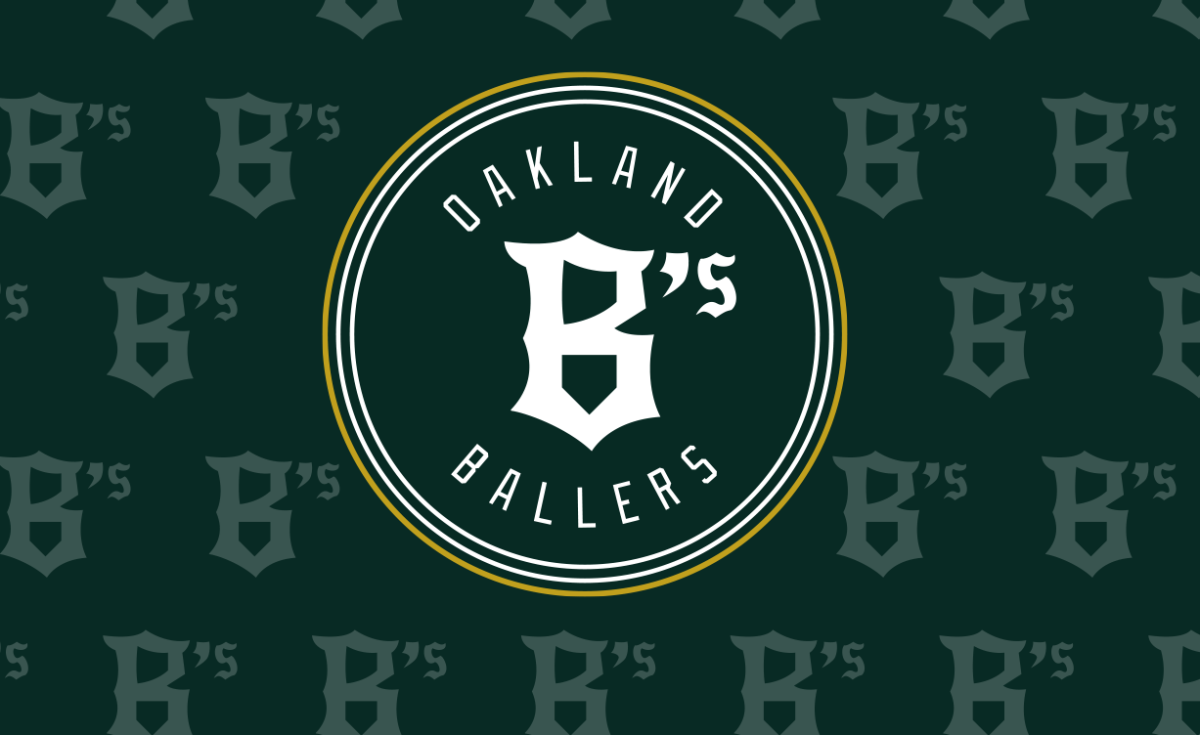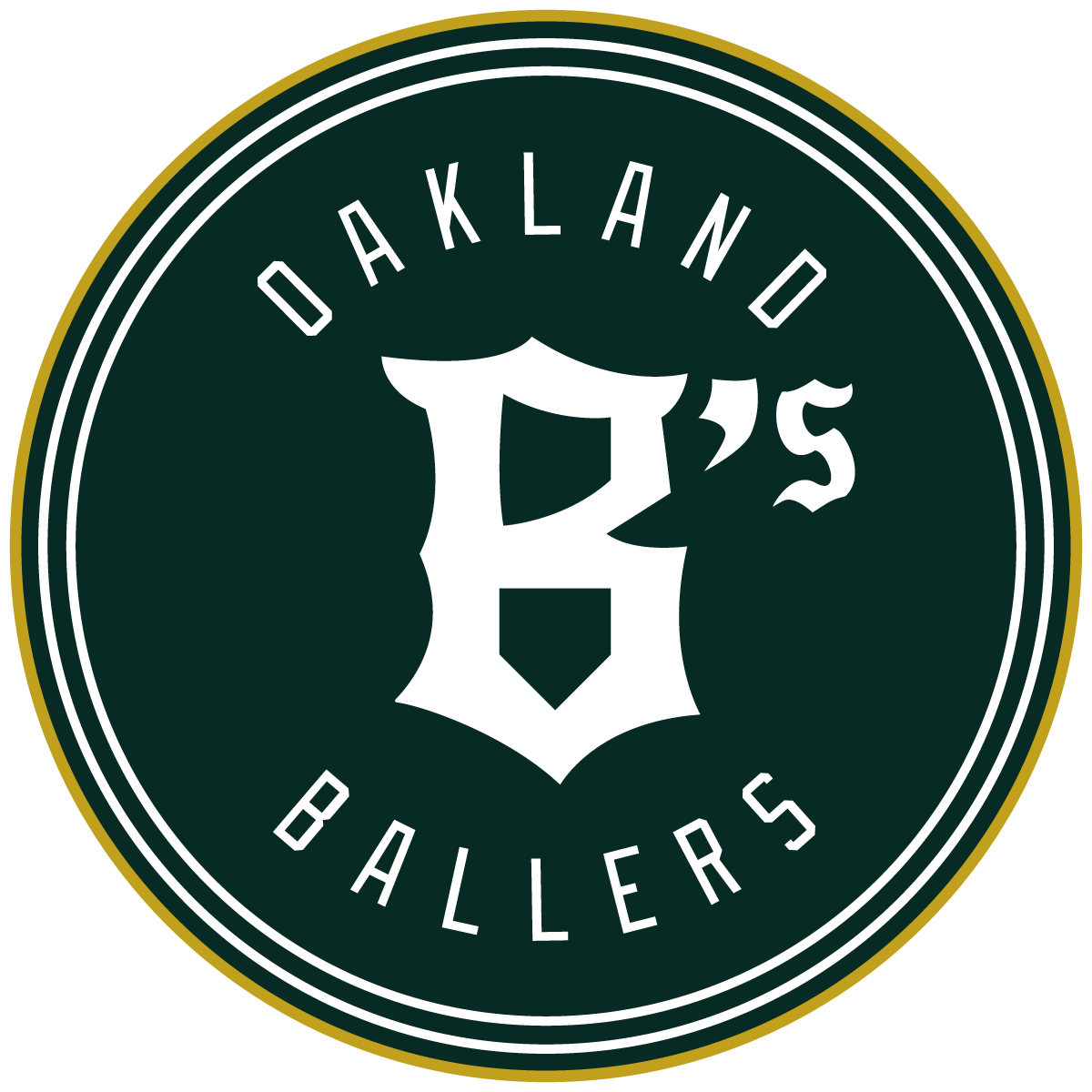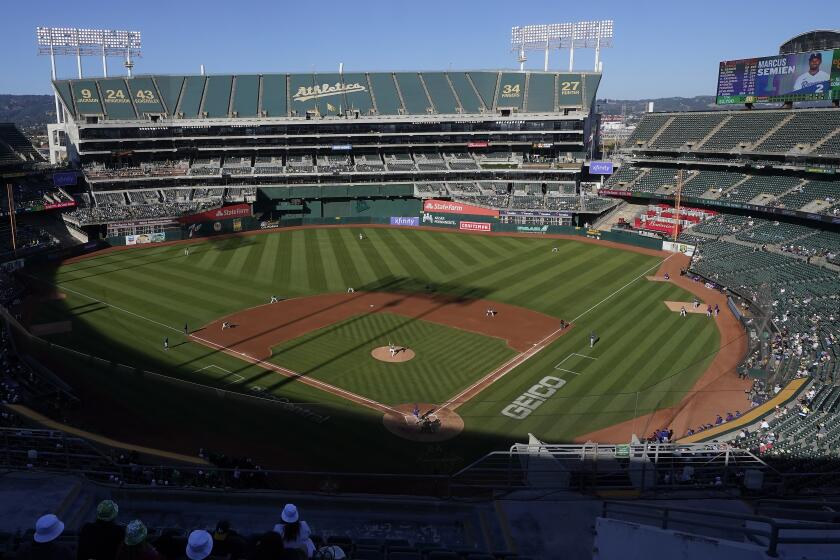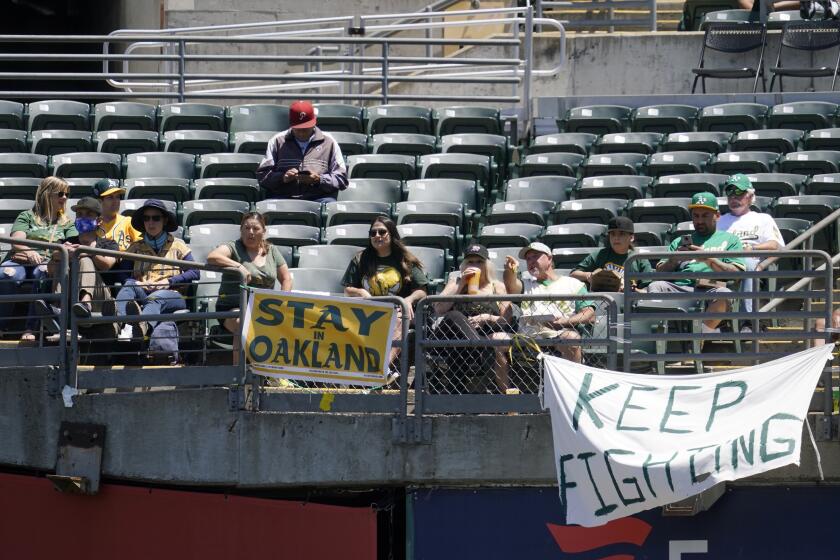Column: Wait for the A’s to leave? Oakland is bringing in another baseball team next year

- Share via
For the past couple of years, as the Oakland Athletics flirted with Las Vegas, the comparison became painfully obvious: On any given night, the major league team in Oakland could be outdrawn by the minor league team in Las Vegas.
For 2024, we present this delicious possibility: On any given night, the major league team in Oakland could be outdrawn by the minor league team in Oakland.
Not even two weeks after Major League Baseball granted the A’s permission to move to Las Vegas, Oakland is doing something about it.
This is not about protesting the inevitable, or about pursuing litigation that would be doomed to fail because of MLB’s antitrust exemption, or about waiting for the expansion team that might never come.
This is about the people of Oakland securing a team to call their own. A minor league team called the Oakland Ballers plans to play ball next year and beyond, cheekily but earnestly pitching that the A’s might leave town but the B’s never will.
With the Oakland Athletics moving to Las Vegas, civic leaders wonder if team owner John Fisher will quickly sell his Oakland Coliseum stake.
“The history of baseball is so intertwined with the history of Oakland,” Ballers founder Bryan Carmel said. “It is a baseball town. It needs a baseball team.”
Carmel, who lives in Los Angeles, is a veteran producer and writer who grew up in Oakland. In June, when Nevada legislators approved $380 million in public funding for an A’s stadium in Las Vegas, Carmel started brainstorming ideas with his high school friend Paul Freedman, an entrepreneur who still lives in Oakland.
They quietly pursued a minor league team in an independent league, meaning the A’s could not stop them. They stealthily lined up support from A’s fan groups. They made rounds of what Freedman called “living room pitches” to East Bay business owners, doctors, lawyers and other civic leaders, raising $2 million and attracting an invitation from the Pioneer League.
“I think the incredible audacity of what they are proposing and what they are putting their money behind is absolutely remarkable,” Pioneer League President Mike Shapiro said.

The Pioneer League, founded in 1939, is where Hall of Famers George Brett and Frank Robinson started their professional careers, and where Tommy Lasorda managed a third baseman named Steve Garvey. Today, the Pioneer League offers a second chance to players undrafted and/or released by major league organizations, with teams in Colorado, Idaho, Montana and Utah.
Neither the Ballers nor any of those opponents would bring Shohei Ohtani or Mike Trout to play in Oakland. Shapiro said it would be “loosely correct” to estimate the franchise fee plus first-year operating costs at about $5 million.
Carmel and Freedman plan to offer ownership stakes to the public, following the lead of the Oakland Roots, a wildly successful minor league soccer team that sold more than $3 million in ownership shares to common fans as well as to such hometown icons as NFL star Marshawn Lynch, NBA star Jason Kidd and Green Day singer Billie Joe Armstrong.
The Roots averaged close to 4,000 fans per game this year, doing what minor league baseball teams long have done: prioritizing fan-friendly entertainment and community involvement over on-field results.

“We’ve been super inspired by the Roots,” Carmel said. “They’re kind of like our older sibling in this initiative.”
Said Freedman: “We believe the whole purpose of sports teams is to galvanize the community. That extends to the concept that fans should literally be able to own the team.”
Carmel and Freedman have hired former Seattle Mariners manager Don Wakamatsu as executive vice president of baseball operations. They have filed a formal application for an Oakland Ballers trademark, and on Tuesday they released a hype video.
Still, the Pioneer League season opens in six months, and the Ballers have yet to finalize an agreement for their home field, planned for a community college in Oakland.
The A’s could be gone from Oakland as soon as 2025, so why would the Ballers not wait until then, tie up all the loose ends, do a full year of marketing, and perhaps launch with the city all to themselves?
“I think the folks in Oakland who have been diehard fans and have suffered through some really tough times with a largely inadequate ownership group and a largely inadequate facility have been underserved,” said Shapiro, who lives in the Bay Area and has worked as an executive for the San Francisco Giants, Baltimore Orioles and Washington Nationals.
“And so why not sooner rather than later? Why not stand up against the A’s and say, ‘This is a market you’re leaving. We think it’s a great market, with great baseball fans. They deserve professional baseball. We’re here to serve those fans.’”
As one fan said after MLB owners voted to allow the team’s relocation to Las Vegas: ‘It just feels like maybe something that was part of the heart of Oakland being ripped out.’
In 2023, the A’s sold fewer than 3,000 tickets to four games and fewer than 4,000 to another five games. That “largely inadequate facility” is the Oakland Coliseum, where the number of human fans has plummeted, even as feral cats and possums have made the stadium their home.
In 2024, now that the Oakland A’s are a dead team walking, their attendance could drop even more. I asked Freedman if there could be days when the Ballers, fielding a largely anonymous roster and playing at a community college, sell more tickets than the A’s.
“If you’re counting humans, we can outdraw them,” he said. “If you’re counting possums, it’s going to be hard.”
More to Read
Go beyond the scoreboard
Get the latest on L.A.'s teams in the daily Sports Report newsletter.
You may occasionally receive promotional content from the Los Angeles Times.













